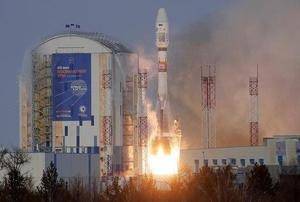MOSCOW - Russia on Thursday successfully launched 11 satellites from its Vostochny cosmodrome, in the third rocket liftoff from the new spaceport, the space agency said.
The country’s first orbital launch of 2018 came after a similar liftoff from the cosmodrome in eastern Russia ended in embarrassment, with officials losing contact with a string of satellites last November. Lifting off as scheduled earlier Thursday, the Soyuz rocket carried two Russian Earth monitoring satellites as its primary payload and nine US and German piggyback satellites.
During its mission the Fregat upper-stage rocket performed a complex sequence, forming several orbits for the delivery of the satellites, the Roscosmos space agency said. “In accordance with the flight programme, the Fregat upper-stage placed into orbit space vehicles of main and secondary payloads,” the space agency said in a statement. Both the Soyuz rocket and the upper stage “performed without a glitch,” the statement added.
Dmitry Rogozin, the deputy prime minister in charge of space, said contact with Russia’s Kanopus-V earth monitoring satellites had been established.
“Thank you everyone,” the official tweeted. The second liftoff from the Vostochny cosmodrome ended in failure last November when Russian officials lost contact with a weather satellite hours after its launch.
Russia is planning to send paying tourists on the International Space Station out on spacewalks for the first time, an official from the country’s space industry said Thursday.
“We are discussing the possibility of sending tourists on spacewalks,” Vladimir Solntsev, the head of Russian space company Energia, told Russian tabloid Komsomolskaya Pravda.
“Market analysts have confirmed this: wealthy people are ready to pay money for this,” Solntsev told the paper.
He said the cost of such a trip could be around $100 million (80 million euros), “possibly less for the first tourist”.
The tourists will be able to “go out on a spacewalk and make a film, (or) a video clip”.
Energia, which was behind the launch of the first man in space Yuri Gagarin in 1961, is currently building a new module dubbed NEM-2 to transport tourists to the International Space Station (ISS).
Solntsev said the NEM-2, the name of which is still to be confirmed, will accommodate four to six people. It will be fitted with “comfortable” cabins, two toilets and internet access.
“It should be launched in 2019,” he said.
“Basically it will be comfortable, as much as that is possible in space,” the space official was quoted as saying.
He added that American aircraft manufacturer Boeing was interested in becoming a partner in the project.
Five to six tourists a year will be able to take a space trip lasting up to 10 days, Solntsev said.
Space tourism is a developing sector currently dominated by Western companies, such as the US-based Virgin Galactic, which unveiled its commercial SpaceShipTwo in 2016.
Russia sent Canadian founder of the Cirque du Soleil, Guy Laliberte, into space in 2009. The billionaire spent two weeks on the ISS.
Iranian-American entrepreneur Anousheh Ansari became the first female space tourist in 2006.






